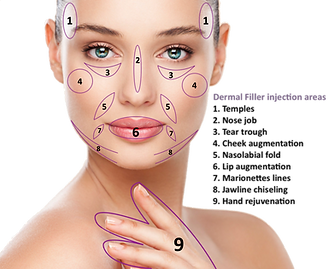













Dermal fillers we use, are gel made of a natural component found in our skin and lips called Hyaluronic Acid. They’re injected in the skin to help fill in facial wrinkles and restoring a smoother appearance. They can also be used for lip and cheek augmentation.
Dermal filler can be used in the following areas:
Temples
Tear trough
Nose correction
Lip augmentation
Cheek augmentation
Nasolabial fold (nose to mouth line)
Marionettes lines (from the corner of the mouth)
Smoker lines, also known as Lipstick lines (found above the upper lip)
Jawline sculpting
Hands rejuvenation
If you have a query about other areas of the face, feel free to email us.
Most areas will require 1ml to 2mls per area, except for cheek augmentation and jawline where 2-4 mls are required. We will be able to advise you during the consultation if you require more than 1 ml.
Dermal fillers are not painful however some areas like the lips can be more sensitive and uncomfortable. The new dermal fillers we use come pre-mixed with a numbing agent called Lidocaine that will numb the area injected. You can put a numbing cream 10 mins before the procedure to reduce discomfort.
Bruising can be avoided if an experienced practitioner performs the injection. Bruising happens when the injector hit a vein. Therefore we always make sure to identify the veins before injecting. Nevertheless bruising is always a possibility but is not that common.
Dermal fillers results are instantaneous. Within seconds your wrinkles will disappear. Cheek and lip augmentation are also instantaneous. You will walk out of the clinic with visible and noticeable changes.
The length of the procedure depends on the area and the amount of filler injected. One area can take between 15 to 30 mins.
As mentioned before, dermal fillers are made of natural component already existing in your body. Therefore dermal fillers will get absorbed slowly by your body. It can last 4 to 12 months depending on the area injected. Areas with minimal facial movement will have longer-lasting dermal filler. It would be difficult to predict for each person how long dermal filler would last, as every person has a different metabolism. Therefore it might be necessary to top up your dermal filler over the year to maintain the perfect look.
Each company will advertise its dermal filler as the best one. Don’t believe everything you read in a magazine as every dermal filler has its cons and pro. The choice of dermal filler depends on the doctor’s technique and the area being injected.
All our dermal fillers are made of natural component and well-known brands.
Our wide range of dermal fillers includes Restylane® and Belotero®.
Lips are full of blood vessels therefore mild swelling is expected for 2-3 days. You might feel that your lips are tense when the numbing agent starts wearing off. There is no need to panic, as the swelling will progressively go down. Lips can look slightly asymmetrical when swollen but this should improve when the swelling resolve. So it can take a few days for the lips to take their final shape. If you’re not fully satisfied with the final shape of your lips, you can email us to book you in for a free consultation.
Treating tear trough for sunken or baggy eyes is a sensitive procedure as the skin is very thin under the eyes. Therefore this area can easily bruise and become puffy lasting up to two weeks. Although most of the patients leave without any visible marks, we would advise avoiding this procedure if you have an important event to attend within a month. Nevertheless, the outcome of this procedure is outstanding as it gets rid of the tired-looking face. The procedure should be only done by an experienced practitioner who has done this multiple time as this area is very delicate.
Occasionally some redness, swelling and tenderness can occur immediately in the injection site, lasting for a few hours. However swelling following lip/tear trough treatment can last for a few days.
Dermal fillers are safe products, however, there are few people who need to avoid it:
Allergy to Hyaluronic Acid.
Allergy to Lidocaine or Adrenaline => could be avoided by using dermal fillers and cream not containing Lidocaine/Adrenaline.
Patients with bleeding and blood disorders/leukaemia/lymphoma. (You need clearance from your haematologist before proceeding, as the risk of infection is higher)
Patient on chemotherapy or immunosuppressant. (You need clearance from your haematologist/oncologist before proceeding, as the risk of infection is higher)
Sensitivity to gram-positive bacteria proteins.
Active infection or inflammation in the skin area to be injected.
Patient with on-going other facial treatments as chemical peels, laser treatment or microderm abrasion.
Patients at risk of Keloids (hypertrophic scarring).
Patient with active cold sore.
Pregnant and breastfeeding women (best to be avoided despite no real evidence)
Patients planning to have facial surgery in the next 12 months.
Patient on blood thinning agents (for example Aspirin, Clopidogrel, NSAIDS, Warfarin and Apixaban) can have dermal fillers. However the risk of bruising is higher.
It is normal for the skin to be red around the area of injection but also white around the area where the anaesthetic cream/injection was applied. This should only last a few hours.
Lumps can occasionally occur when the dermal filler absorbs water from the body and swells. For the first 24 hours after treatment these lumps can easily be massaged away (between finger and thumb). Don’t massage lumps that you cannot see as this will only displace your filler.
Rarely numbness and/or tingling over the site of injection may occur for a few days.
Bruising is the most common complication of treatment. You can reduce bruising by applying ice; it is ok to cover up bruising with concealer/makeup the next day.
Avoid applying makeup over the injection sites for 12 hours. This is to reduce the already small risk of skin infection.
Often superficial lines in the face are ‘highlighted’ in pink or red following treatment. This effect will settle within a few days.
Dermal filler applied to the lips often causes swelling. The amount of swelling is not proportional to the amount of filler inserted. Your lips will settle within a few days to how they should look for the remainder of your treatment cycle. Sometimes it may look as if more dermal filler has been placed into one side or the other; this is due to swelling. In a few days this should even out. However, if an individual small lump can be seen, this should be massaged firmly in the first 24 hrs following treatment.
Until the initial swelling and redness have resolved, do not expose the treated area to intense heat (i.e. solarium, sauna or sunbathing).
If you have previously suffered from facial cold sores, there is a risk that the needle punctures could contribute to another eruption of cold sores. This question is on the consent form.
If you are using aspirin, clopidogrel, warfarin or similar medication, be aware that these may increase the bruising or bleeding at the injection site.
Finally, since dermal fillers dissolve over time, the correction does not last forever. Many people choose to have regular repeat treatments.
If the area injected become white and/or very painful following dermal filler injection you need to get in touch with us. Fortunately, this would be extremely rare to happen (1 in 1 million). Otherwise, we expect patients to have a mild irritation to the injected skin lasting few hours when the numbness wears off.
Dermal fillers are not painful however some areas like the lips can be more sensitive. The new dermal fillers we use come pre-mixed with a numbing agent called Lidocaine that will numb the area injected. You can put a numbing cream 10 mins before the procedure to reduce discomfort.
